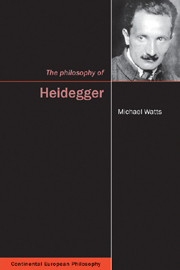Book contents
- Frontmatter
- Contents
- Preface
- Abbreviations
- 1 Heidegger's life
- 2 The meaning of life: the question of Being
- 3 The central ideas in Being and Time
- 4 Conscience, guilt and authenticity
- 5 Being-towards-death
- 6 Dasein's primordial temporality
- 7 The “truth of alētheia” and language
- 8 Heidegger on poetry, poets and Hölderlin
- 9 Heidegger on art
- 10 Heidegger on technology
- 11 Tao, Zen and Heidegger
- 12 Heidegger's politics
- Glossary
- Further reading
- Bibliography
- Index
4 - Conscience, guilt and authenticity
- Frontmatter
- Contents
- Preface
- Abbreviations
- 1 Heidegger's life
- 2 The meaning of life: the question of Being
- 3 The central ideas in Being and Time
- 4 Conscience, guilt and authenticity
- 5 Being-towards-death
- 6 Dasein's primordial temporality
- 7 The “truth of alētheia” and language
- 8 Heidegger on poetry, poets and Hölderlin
- 9 Heidegger on art
- 10 Heidegger on technology
- 11 Tao, Zen and Heidegger
- 12 Heidegger's politics
- Glossary
- Further reading
- Bibliography
- Index
Summary
A central Heideggerian claim is that conscience and guilt are fundamentally important human existentials because they reveal our authentic self-hood and the basis of freedom. The voice of conscience calls us to focus directly on our authentic self.
Conscience
Heidegger ignores traditional ethical or religious views of conscience and guilt, and instead offers a fundamental, existential interpretation that sheds further light on our way of Being. He emphasizes that not everyone has a “conscience” (lower-case “c”), in terms of our conventional understanding of the word, but everyone has a “Conscience” (capital “C”) in the more fundamental, existential sense. This fundamental Conscience – unlike conscience in the traditional sense – does not have an inner voice that judges, commands, forbids, condemns or excuses actions on moral grounds. Heidegger regards the moral judgements of traditional conscience as relatively superficial (BT: 328–9, 332, 334), and his “existential” Conscience is stripped bare of all such ethical content. He claims that only when we respond to the special moments of insight offered by our Conscience can we develop the authentic understanding necessary for a genuine “conscience” (in the traditional sense).
- Type
- Chapter
- Information
- The Philosophy of Heidegger , pp. 81 - 94Publisher: Acumen PublishingPrint publication year: 2011

